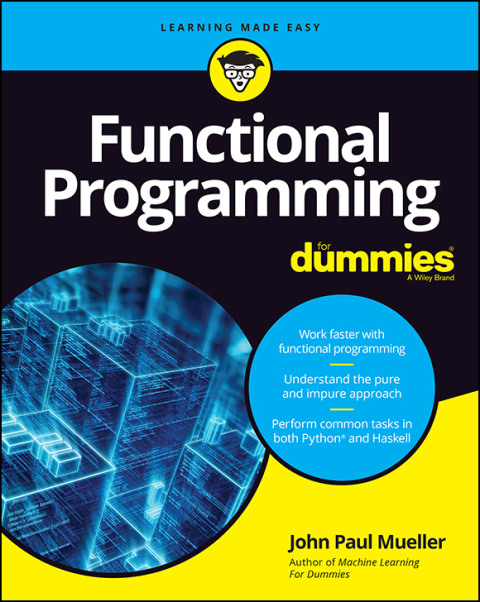Description
Efnisyfirlit
- Cover
- Introduction
- About This Book
- Foolish Assumptions
- Icons Used in This Book
- Beyond the Book
- Where to Go from Here
- Part 1: Getting Started with Functional Programming
- Chapter 1: Introducing Functional Programming
- Defining Functional Programming
- Considering Other Programming Paradigms
- Using Functional Programming to Perform Tasks
- Discovering Languages That Support Functional Programming
- Finding Functional Programming Online
- Chapter 2: Getting and Using Python
- Working with Python in This Book
- Obtaining Your Copy of Anaconda
- Downloading the Datasets and Example Code
- Creating a Python Application
- Running the Python Application
- Understanding the Use of Indentation
- Adding Comments
- Closing Jupyter Notebook
- Getting Help with the Python Language
- Chapter 3: Getting and Using Haskell
- Working with Haskell in This Book
- Obtaining and Installing Haskell
- Testing the Haskell Installation
- Compiling a Haskell Application
- Using Haskell Libraries
- Getting Help with the Haskell Language
- Part 2: Starting Functional Programming Tasks
- Chapter 4: Defining the Functional Difference
- Comparing Declarations to Procedures
- Understanding How Data Works
- Seeing a Function in Haskell
- Seeing a Function in Python
- Chapter 5: Understanding the Role of Lambda Calculus
- Considering the Origins of Lambda Calculus
- Understanding the Rules
- Performing Reduction Operations
- Creating Lambda Functions in Haskell
- Creating Lambda Functions in Python
- Chapter 6: Working with Lists and Strings
- Defining List Uses
- Creating Lists
- Evaluating Lists
- Performing Common List Manipulations
- Understanding the Dictionary and Set Alternatives
- Considering the Use of Strings
- Part 3: Making Functional Programming Practical
- Chapter 7: Performing Pattern Matching
- Looking for Patterns in Data
- Understanding Regular Expressions
- Using Pattern Matching in Analysis
- Working with Pattern Matching in Haskell
- Working with Pattern Matching in Python
- Chapter 8: Using Recursive Functions
- Performing Tasks More than Once
- Understanding Recursion
- Using Recursion on Lists
- Passing Functions Instead of Variables
- Defining Common Recursion Errors
- Chapter 9: Advancing with Higher-Order Functions
- Considering Types of Data Manipulation
- Performing Slicing and Dicing
- Mapping Your Data
- Filtering Data
- Organizing Data
- Chapter 10: Dealing with Types
- Developing Basic Types
- Composing Types
- Parameterizing Types
- Dealing with Missing Data
- Creating and Using Type Classes
- Part 4: Interacting in Various Ways
- Chapter 11: Performing Basic I/O
- Understanding the Essentials of I/O
- Manipulating I/O Data
- Using the Jupyter Notebook Magic Functions
- Receiving and Sending I/O with Haskell
- Chapter 12: Handling the Command Line
- Getting Input from the Command Line
- Accessing the Command Line in Haskell
- Accessing the Command Line in Python
- Chapter 13: Dealing with Files
- Understanding How Local Files are Stored
- Ensuring Access to Files
- Interacting with Files
- Manipulating File Content
- Completing File-related Tasks
- Chapter 14: Working with Binary Data
- Comparing Binary to Textual Data
- Using Binary Data in Data Analysis
- Understanding the Binary Data Format
- Working with Binary Data
- Interacting with Binary Data in Haskell
- Interacting with Binary Data in Python
- Chapter 15: Dealing with Common Datasets
- Understanding the Need for Standard Datasets
- Finding the Right Dataset
- Loading a Dataset
- Manipulating Dataset Entries
- Part 5: Performing Simple Error Trapping
- Chapter 16: Handling Errors in Haskell
- Defining a Bug in Haskell
- Understanding the Haskell-Related Errors
- Fixing Haskell Errors Quickly
- Chapter 17: Handling Errors in Python
- Defining a Bug in Python
- Understanding the Python-Related Errors
- Fixing Python Errors Quickly
- Part 6: The Part of Tens
- Chapter 18: Ten Must-Have Haskell Libraries
- binary
- Hascore
- vect
- vector
- aeson
- attoparsec
- bytestring
- stringsearch
- text
- moo
- Chapter 19: Ten (Plus) Must-Have Python Packages
- Gensim
- PyAudio
- PyQtGraph
- TkInter
- PrettyTable
- SQLAlchemy
- Toolz
- Cloudera Oryx
- funcy
- SciPy
- XGBoost
- Chapter 20: Ten Occupation Areas that Use Functional Programming
- Starting with Traditional Development
- Going with New Development
- Creating Your Own Development
- Finding a Forward-Thinking Business
- Doing Something Really Interesting
- Developing Deep Learning Applications
- Writing Low-Level Code
- Helping Others in the Health Care Arena
- Working as a Data Scientist
- Researching the Next Big Thing
- Index
- About the Author
- Connect with Dummies
- End User License Agreement








Reviews
There are no reviews yet.